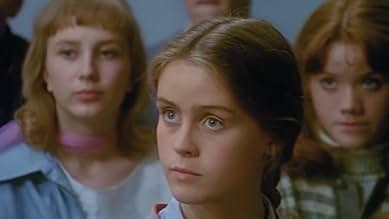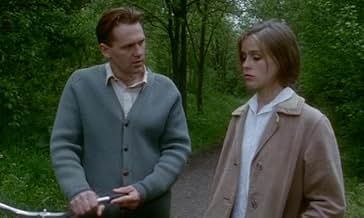IMDb रेटिंग
6.9/10
1.3 हज़ार
आपकी रेटिंग
अपनी भाषा में प्लॉट जोड़ेंThe Other Side of Sunday criticizes the small, and often tight church community. We follow the Preachers Daughter; Maria, in her journey to liberate herself from the stiff church community a... सभी पढ़ेंThe Other Side of Sunday criticizes the small, and often tight church community. We follow the Preachers Daughter; Maria, in her journey to liberate herself from the stiff church community and her strict religious father.The Other Side of Sunday criticizes the small, and often tight church community. We follow the Preachers Daughter; Maria, in her journey to liberate herself from the stiff church community and her strict religious father.
- 1 ऑस्कर के लिए नामांकित
- 9 जीत और कुल 7 नामांकन
Petter Width Kristiansen
- Pål Helge
- (as Petter With Kristiansen)
फ़ीचर्ड समीक्षाएं
I'd not heard of this film before it appeared on our TV and, going by the extent of feedback to IMDB, it has not been widely seen or appreciated.
The storyline is simple. It concerns a teenage girl growing up in late 1950s Norway, in a strict religious household, with her father the local pastor. She begins to realise that there is more in the world than strict orthodox Christianity. This leads to increasing tensions and her gradual rebellion.
The film is warm and human, and there is enough wit and humour to prevent it becoming tedious, dry, or just another "teenage rebellion" movie. Having had a relatively similar upbringing, I found a great deal of honesty in this film.
The photography, acting, late 1950s musical background and overall quality are excellent, with possibly a nod of recognition to Bergman. As I said in my one-line summary, this film really does deserve more recognition.
The storyline is simple. It concerns a teenage girl growing up in late 1950s Norway, in a strict religious household, with her father the local pastor. She begins to realise that there is more in the world than strict orthodox Christianity. This leads to increasing tensions and her gradual rebellion.
The film is warm and human, and there is enough wit and humour to prevent it becoming tedious, dry, or just another "teenage rebellion" movie. Having had a relatively similar upbringing, I found a great deal of honesty in this film.
The photography, acting, late 1950s musical background and overall quality are excellent, with possibly a nod of recognition to Bergman. As I said in my one-line summary, this film really does deserve more recognition.
It is the late 1950s in a small village in Norway. Bjørn Sundquist plays Johannes, a priest in the Church of Norway. Johannes has a wife, a son, and two daughters. The story revolves around Johannes, his pretty older teenage daughter Marie (Marie Theisen), and his church organist and assistant Mrs. Tunheim. Oddly we never know the family name of Johannes' family--the only person with a last name is Mrs. Tunheim, and we never know her first name. Johannes is stern and unyielding in his behavior. In the pulpit he is seen promoting the usual Christian pieties; his congregation looks like they are attending a funeral rather than a service. The rule is to look straight forward during a service and the first hint we get of what is to come is Marie's pinching her sister during a service. Johannes is harsh with his family and a prominent theme is the ongoing battle of wills between him and Marie. However, in several scenes we see a human side of Johannes that somewhat soften the initial stereotypical image that we might have of him.
Marie struggles to understand her religion and her burgeoning sexuality. Even in the face of the rigidity of her father's religious positions (or because of them) Marie has questions. As one example of her questioning consider this conversation with Mrs. Tunheim:
Marie: Do you think God did a poor job when he created man?
Mrs.Tunheim: Why do you ask?
Marie: He created us so that we have to ask forgiveness all the time. Isn't that a poor creation?
Or this reflection: "Isn't it just some sort of invention to love and cherish until death do you part? I love meatballs, but I cannot promise God that I will do that for the rest of my life." The movie often mixes humor with its more serious considerations.
Music plays an essential role in the film, ranging from Bach to 50s pop ballads. Music contributes to some exquisitely beautiful scenes like the one where Marie swims naked in the river.
All the actors capably handle the subtle complexities demanded of them, but it is ultimately Marie Theisen who carries the film and raises it above the average. She perfectly captures the questioning innocence at the core of Marie's personality and the stubborn persistence to find her own way in an environment that is trying to impose conformity. Marie is not about to give up on God, she is just looking for her own God--a God of nature, a God of forgiveness, a God who likes us when we are happy. This movie can be seen as a kinder and gentler version of a Bergman film that treats the same themes.
Expect surprises on the way to a definitive final scene.
Marie struggles to understand her religion and her burgeoning sexuality. Even in the face of the rigidity of her father's religious positions (or because of them) Marie has questions. As one example of her questioning consider this conversation with Mrs. Tunheim:
Marie: Do you think God did a poor job when he created man?
Mrs.Tunheim: Why do you ask?
Marie: He created us so that we have to ask forgiveness all the time. Isn't that a poor creation?
Or this reflection: "Isn't it just some sort of invention to love and cherish until death do you part? I love meatballs, but I cannot promise God that I will do that for the rest of my life." The movie often mixes humor with its more serious considerations.
Music plays an essential role in the film, ranging from Bach to 50s pop ballads. Music contributes to some exquisitely beautiful scenes like the one where Marie swims naked in the river.
All the actors capably handle the subtle complexities demanded of them, but it is ultimately Marie Theisen who carries the film and raises it above the average. She perfectly captures the questioning innocence at the core of Marie's personality and the stubborn persistence to find her own way in an environment that is trying to impose conformity. Marie is not about to give up on God, she is just looking for her own God--a God of nature, a God of forgiveness, a God who likes us when we are happy. This movie can be seen as a kinder and gentler version of a Bergman film that treats the same themes.
Expect surprises on the way to a definitive final scene.
Great norwegian movie about a priest's teenaged daughter, who has different views on religion than her father... Great movie. I am proud to be Norwegian when I see this movie...
Hmm I see that this film has been enjoyed all over the world, and I must say I'm a little surprised.. I am a Norweigian and I have seen it a couple of times when it has gone on the TV for some years ago, but I never thought it would reach out to so many people... The funny thing is.... I'm in it. Now a 27 year old man going on 28, its strange seeing that even now, almost eleven years after, it still touches people. My part wasn't big, though I had a few lines, but it is such a strange feeling to have been part of something that still is held so close to the heart that some of the "fans" of the film keep it. I remember being a little embarrassed the first time I saw it on the premiere in Oslo, cause I guess i was hoping for something more exciting. You must remember I was only 16. But now I see it in a different way. I hope you all still will enjoy the film as I enjoyed being part of it..
10pdee-1
I consider this movie to be outstanding - well worth a 10. It is a totally Norwegian production and therefore doesn't suffer the defects of the Scandinavian co-productions with characters confusingly and variously speaking in Swedish,Danish and Norwegian. The plot is straightforward and the cinematography is excellent. The acting is first class and as a Norwegian Broadcasting Corporation production is up there with the best that the BBC can produce. I am surprised that Marie Theisen has seemingly dropped out of films after a second film which I have been unable to obtain. The present film received a well deserved Oscar nomination. Ms.Theisen now appears to be a film reviewer for Kanal 24 in Norway. Such a pity that she is out of the production side.
क्या आपको पता है
- ट्रिवियाIn 1997, this movie was nominated for an Oscar in the category "best foreign language film". Marie Theisen, who was 15 years old during the filming, had the main role in it. In an interview, she said that she realized her full nude swimming scene was difficult to accept for the American audience, but she thought it was well done and absolutely necessary for the context.
- कनेक्शनReferenced in Norsk film er ____!?: I FOKUS på Norske Oscar-nominasjoner (2022)
- साउंडट्रैकLove letters in the sand
Performed by Pat Boone
टॉप पसंद
रेटिंग देने के लिए साइन-इन करें और वैयक्तिकृत सुझावों के लिए वॉचलिस्ट करें
- How long is The Other Side of Sunday?Alexa द्वारा संचालित
विवरण
बॉक्स ऑफ़िस
- US और कनाडा में सकल
- $4,769
- US और कनाडा में पहले सप्ताह में कुल कमाई
- $2,621
- 3 मई 1998
- दुनिया भर में सकल
- $4,769
इस पेज में योगदान दें
किसी बदलाव का सुझाव दें या अनुपलब्ध कॉन्टेंट जोड़ें
























